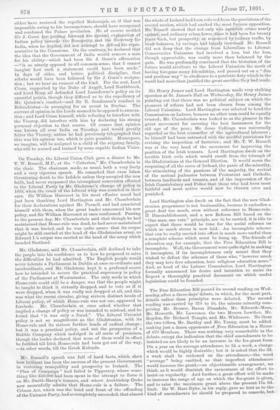The Free Education Bill passed its second reading on Wed-
nesday, after a three-days' debate, in which, for the most part, details rather than principles were debated. The second reading was carried by 318 to 10, the minute minority com- prising Mr. Bonsor, Baron Dimsdale, Mr. Edwardr-Moss, Mr. Howorth, Mr. Lawrence, the two Messrs. Lowther, Mr. Hoyden, Sir Richard Temple, and Mr. Whitmore. To these the two tellers, Mr. Bartley and Mr. Young, must be added making just a dozen opponents of .Free Education in a House of 670 Members. There was nothing very remarkable in the debate, except the indication that the chief amendments to be insisted on are likely to be an increase in the fee-grant from 10s. a year on the average attendance, to 3d. a week, a change which would be highly desirable ; but it is asked that the 3d. a week shall be reckoned on the attendance,—the word " average " being omitted, so that imperfect attendances would increase the grant,—an objectionable arrangement, we think, as it would diminish the earnestness of the effort to insist on regularity. And further, a great effort will be made to increase the range of age on which the fee-grant is given„ and to raise the maximum grant above the present 17s. 6d. limit. Sir W. Hart Dyke, in his reply, gave no hint as to the kind of amendments he should be prepared to concede, but showed that, so far from the voluntary subscriptions and en- dowments dwindling, they; had together increased by a sum amounting to 240,000 a year in the last year for which the figures are known. No more remarkable division has ever taken place in the House of Commons than that which carried the principle of Free Education by more than 96 per cent, of the Members present.



































 Previous page
Previous page